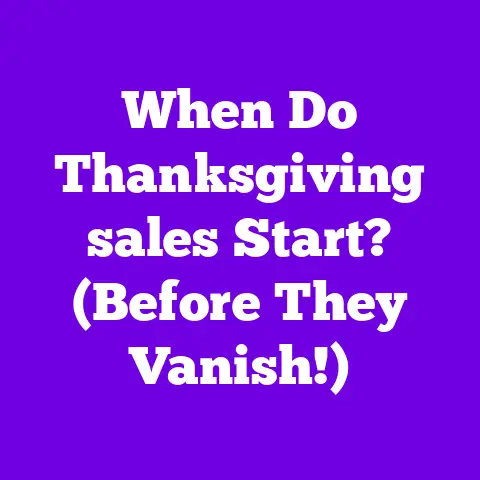When Do You Need a Bill of sale? (Don’t Risk Price Gouging!)
Many people believe that a bill of sale is only necessary for significant purchases, such as cars or real estate.
I used to think the same way!
A bill of sale is more than just a receipt; it’s a crucial document for various transactions, both big and small.
Without it, you leave yourself vulnerable.
In this article, I’ll break down why a bill of sale is so important, covering everything from its legal implications to specific circumstances that necessitate its use.
I’ll also explain how a bill of sale can protect you from price gouging, especially in unpredictable times.
Let’s dive in and make sure you’re prepared for any transaction that comes your way in 2025.
Section 1: Understanding the Bill of Sale
So, what exactly is a bill of sale?
Simply put, a bill of sale is a legal document that transfers ownership of property from a seller to a buyer.
It acts as a receipt, proof of ownership, and a record of the transaction.
It’s a written agreement that confirms the details of a sale, protecting both parties involved.
There are different types of bills of sale, depending on the type of property being transferred:
-
General Bill of Sale: This is a broad, all-purpose document used for various types of personal property.
Motor Vehicle Bill of Sale: Specifically designed for the sale of cars, trucks, motorcycles, and other vehicles.
These often require specific information like VIN numbers and odometer readings.-
Personal Property Bill of Sale: Used for the sale of individual items, such as furniture, electronics, or collectibles.
The legal significance of a bill of sale lies in its ability to provide clear evidence of the transaction.
It serves as a receipt, establishing that payment was made and accepted.
More importantly, it acts as proof of ownership, which is crucial if you ever need to register the item, insure it, or resell it.
Examples of Common Transactions Requiring a Bill of Sale:
- Private Sales of Goods: Buying a used refrigerator from a neighbor.
- Equipment Sales: Purchasing a used lawnmower or construction equipment.
- Collectibles: Buying or selling valuable antiques, artwork, or sports memorabilia.
Section 2: When Is a Bill of Sale Required?
Now, let’s get into the specifics of when you absolutely need a bill of sale.
While it’s always a good idea to have one, there are certain situations where it’s essential.
Vehicle Purchases (New and Used): This is perhaps the most common scenario.
When buying a car, whether new or used, a bill of sale is almost always required for registration and titling purposes.
According to the National Conference of State Legislatures, most states require specific information on a vehicle bill of sale, including the VIN, purchase price, and the names and addresses of the buyer and seller.-
Real Estate Transactions: While a deed is the primary document for transferring real estate ownership, a bill of sale may be used to transfer personal property included in the sale, such as appliances or furniture.
Sales of Personal Property: This is where things get a little less clear-cut.
While you might not think you need a bill of sale for every item you sell, it’s a good idea for anything of significant value.
For example, if you’re selling a valuable piece of furniture or an expensive electronic device, a bill of sale can protect both you and the buyer.Transactions Involving Businesses or Business Assets: When buying or selling a business, a bill of sale is used to transfer ownership of assets like equipment, inventory, and intellectual property.
This is crucial for documenting the transfer of ownership and protecting against future disputes.
State-Specific Laws:
It’s important to note that state laws vary regarding when a bill of sale is legally required.
For instance, some states may require a bill of sale for the sale of firearms, while others may not.
To find the specific requirements in your state, check your state’s Department of Motor Vehicles (DMV) or Department of Revenue websites.
Less Formal Transactions:
Even in less formal transactions, such as online sales or auctions, having a bill of sale can be invaluable.
I once purchased a vintage guitar on eBay, and while the seller seemed reputable, I insisted on a bill of sale.
It turned out to be a wise decision, as the guitar arrived with undisclosed damage.
The bill of sale, which clearly stated the condition of the guitar at the time of sale, helped me negotiate a partial refund with the seller.
Section 3: The Risks of Not Using a Bill of Sale
Skipping the bill of sale might seem like a small oversight, but it can open you up to a world of potential problems.
Let’s explore some of the risks involved.
Increased Vulnerability to Fraud and Scams: Without a bill of sale, it’s much easier for unscrupulous individuals to take advantage of you.
For example, a seller could falsely claim that you never paid for an item, or a buyer could claim that you misrepresented its condition.Difficulty Proving Ownership or Resolving Disputes: Imagine buying a used car without a bill of sale, only to discover later that the seller didn’t actually own the vehicle.
Without documentation, proving your ownership can be a nightmare.
According to a report by the Federal Trade Commission (FTC) in 2023, disputes over ownership are a leading cause of consumer complaints related to private sales.Challenges in Recouping Losses from Price Gouging or Unfair Pricing Practices: As we’ll discuss later, a bill of sale is crucial for documenting the agreed-upon price of an item.
Without it, it’s much harder to prove that you were a victim of price gouging.
Real-Life Anecdotes:
I once knew someone who bought a used motorcycle without a bill of sale.
A few weeks later, the police contacted him, claiming the motorcycle was stolen.
Because he had no proof of purchase, he lost both the motorcycle and the money he paid for it.
This is a harsh example, but it highlights the importance of documentation.
Impact on Warranties and Returns:
Many warranties and return policies require proof of purchase.
Without a bill of sale, you may be unable to claim a warranty or return an item, even if it’s defective.
Section 4: How a Bill of Sale Protects You from Price Gouging
Price gouging is the practice of raising prices on goods, services, or commodities to an unreasonable or unfair level, especially during emergencies or periods of high demand.
It’s a predatory tactic that can leave consumers vulnerable and exploited.
A bill of sale can serve as a crucial protective measure against price gouging by:
Documenting Agreed-Upon Prices: A bill of sale clearly states the price that both parties agreed upon at the time of sale.
This provides concrete evidence of the item’s value and can be used to challenge any attempts to inflate the price later on.Establishing a Baseline: In times of crisis, when prices can fluctuate wildly, a bill of sale can help establish a baseline price for goods and services.
This can be useful in identifying instances of price gouging and reporting them to the appropriate authorities.
Examples of Industries Vulnerable to Price Gouging:
- Fuel: During natural disasters or supply disruptions, gas stations may attempt to raise prices to exorbitant levels.
- Water and Food: Essential supplies like bottled water and non-perishable food items are often targets of price gouging during emergencies.
- Healthcare: Medical supplies and services can also be subject to price gouging, particularly during pandemics or other health crises.
Case Study:
During the COVID-19 pandemic, there were numerous reports of price gouging on essential items like hand sanitizer and face masks.
In many cases, consumers who had receipts or bills of sale were able to successfully file complaints and receive refunds or restitution.
Section 5: Creating and Using a Bill of Sale
Now that you understand the importance of a bill of sale, let’s talk about how to create and use one effectively.
Step-by-Step Guide:
-
Gather Essential Information:
- Buyer and Seller Information: Full names, addresses, and contact information.
- Item Description: A detailed description of the item being sold, including make, model, serial number (if applicable), and condition.
- Price: The agreed-upon price of the item.
- Date: The date of the sale.
- Signatures: Both the buyer and seller must sign and date the bill of sale.
Use a Template or Create Your Own: There are many free bill of sale templates available online.
You can also create your own, ensuring that it includes all the essential elements.Customize for Specific Transactions: Tailor the bill of sale to the specific transaction.
For example, if you’re selling a vehicle, include the VIN and odometer reading.
If you’re selling artwork, include details about the artist, title, and provenance.-
Retain Copies: Both the buyer and seller should retain copies of the bill of sale for their records.
Digital Bills of Sale:
In today’s e-commerce environment, digital bills of sale are becoming increasingly common.
These can be created and signed electronically using tools like DocuSign or Adobe Sign.
Digital bills of sale are legally binding, provided that they meet certain requirements, such as:
- Clear Identification of Signatories: The digital signature must be linked to a specific individual.
- Intent to Sign: The signatory must clearly indicate their intention to sign the document.
- Secure Storage: The digital bill of sale must be stored securely to prevent tampering.
Conclusion
Understanding when a bill of sale is necessary is crucial for protecting yourself from fraud, disputes, and price gouging.
Don’t make the mistake of assuming that it’s only for high-value transactions.
A bill of sale is a valuable tool for documenting any sale, regardless of size or perceived value.
I encourage you to be proactive in protecting yourself by using a bill of sale in all transactions.
Educate yourself about your rights and the importance of proper documentation.
By taking these steps, you can safeguard your interests and avoid potential problems down the road.
Remember, a little bit of preparation can go a long way in ensuring a smooth and secure transaction.
Don’t wait until it’s too late – start using bills of sale today!






